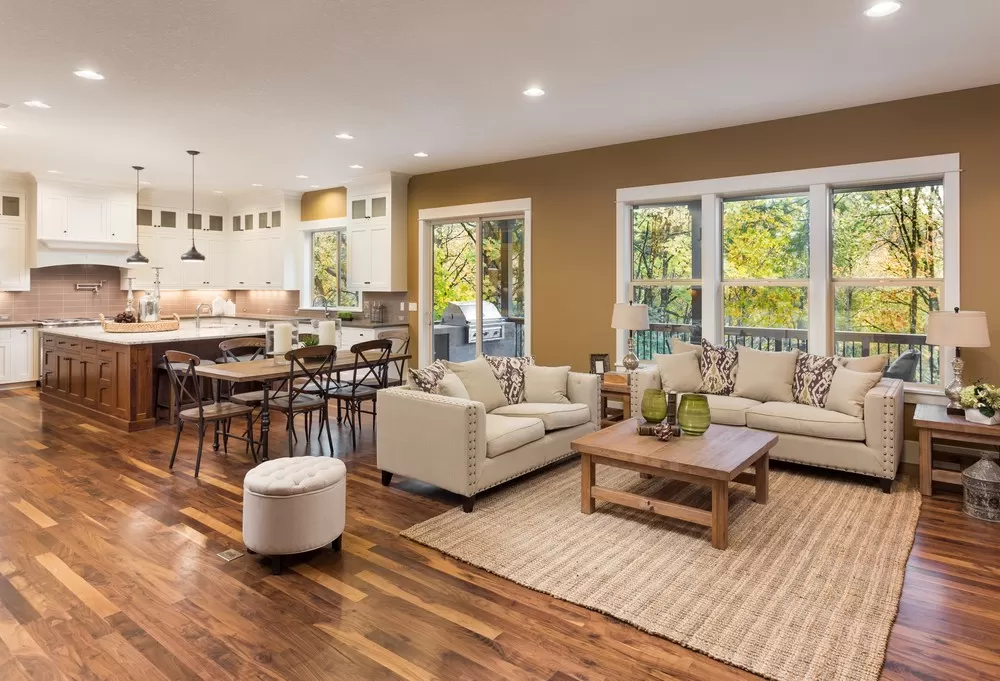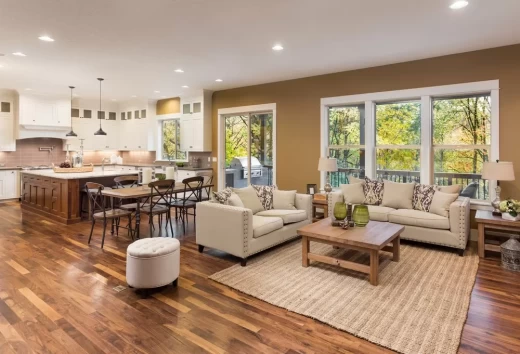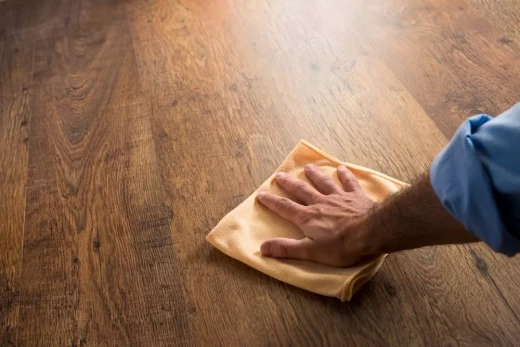5 pros and 4 cons of hardwood flooring for residential properties, floor design tips, Property renovation advice guide
Hardwood Flooring for Residential Properties Guide
3 Mar 2023
When thinking about floors, hardwoods immediately come to mind. Hardwood timber comes from slow-growing trees; hence they’re denser and stronger. Because of these qualities, hardwood flooring is associated with high quality, making them popular among homeowners.
In truth, there are many other reasons why you should choose hardwood flooring. However, have you ever wondered about its drawbacks?
To decide whether to go for hardwood flooring for your home, consider its advantages and disadvantages.
5 Pros of Hardwood Flooring for Residential Properties
Pros
Listed below are some of the reasons why homeowners love hardwood floors.
- Timeless Style
Hardwood floors come in a wide selection. You can find the perfect shade and grain to suit any space. According to experts from Wooden Floors UK, oak is a classic choice with its alternating light and dark rings that make the grain distinctively beautiful.
In addition, this flooring type adds a natural appeal and authenticity to any space. Regardless of the type of hardwood, you can be assured of its quality and aesthetics.
- Looks Good
Hardwood flooring is ideal if you’re after a classic look. This flooring exudes an elegance that remains unmatched.
You can choose from different finishes that add warmth and cosiness, making a home look inviting. Depending on the colour and pattern, hardwood flooring can also create the illusion of space.
Regardless of the theme of your home, hardwood floors can bring together elegance, cosiness, and spaciousness. So, go ahead and use this flooring to make a great impression!
- Low Maintenance
The maintenance of hardwood flooring couldn’t be easier. These floors are relatively easy to keep clean. They can be swept, steam cleaned, wiped, brushed, or vacuumed. Use a soft brush attachment when vacuuming your floors to avoid scratching the surface.
Another outstanding feature of hardwood flooring is its stain resistance. You won’t have to stress too much about spills and dirt.
- Durable
When shown a little love, hardwood flooring can last years and then some. Its durability is one of the top reasons this flooring is an excellent long-term investment. More homeowners opt for hardwood flooring because it can resist wear and tear with proper maintenance.
Finding the proper ways to care for your floors will ensure they remain elegant for years.
- Adds Value To Your Home
Hardwood flooring can increase the value of your property. This type of flooring is often specified in homebuyers’ wish lists due to its advantages.
Therefore, installing hardwood flooring can help you sell your home faster when the time comes.
4 Cons of Hardwood Flooring for Residential Properties
Cons
Like most options, hardwood flooring has its drawbacks. Below are the cons of this type of flooring.
- Expensive
Since hardwood floors can boost the value of your home, you can expect them to be pricier than other options. Note that the upfront costs might fail to fit into a tight budget.
The cost depends on the type of material used in addition to labour expenses. Rare types of wood, like Massachar Ebony and zebrawood, are among the most expensive. Other options include maple, oak, beech, and walnut.
Homeowners who cannot afford traditional hardwood floors may choose engineered hardwood or other alternatives that mimic the appearance and feel of wood.
- Prone To Wear And Tear
Hardwood flooring can be prone to wear and tear if not properly cared for. Over time, you might notice scratches, chips, and stains. This can happen if the right finishing isn’t applied to the wood. However, time is also a significant factor that could lead to stripping the existing finish.
Nonetheless, the best way to keep your floors looking good is by taking good care of them.
- Prone To Water Damage
Water is the enemy of hardwood flooring. When exposed to moisture, the edges of the floorboards start to rise. This is known as cupping, which weakens and damages the wood. The expansion of wood is another thing homeowners may worry about.
Moisture can be caused by spills, using excessive water for cleaning, and flooding. The damage caused by these factors will require expensive repairs.
Wipe any liquid quickly to prevent your hardwood flooring from cupping or swelling.
- Can Be Noisy
Although hardwood flooring doesn’t make noise when new, it will likely do so over time. Older floors tend to be squeaky due to wear and tear. Such sounds can be pretty loud and unpleasant.
You may use construction adhesive to fill the gaps between the joist and subfloor to address squeaky floors.
Home Wood Floors Bottom Line
Hardwood flooring is one of the top choices for residential properties because of its beauty, durability, and timeless elegance. Nothing can beat its quality and value. Thus, it’s a feature that many homebuyers look for.
However, hardwood floors can be costly and prone to wear and tear and water damage. So, when you choose this flooring type, you must be fully committed to maintaining it.
Carefully weigh the pros and cons of hardwood flooring to make the right decision for your home.
Comments on this Pros and Cons of Hardwood Flooring for Residential Properties article are welcome.
Property Design
Property Designs – selection from this architectural website:
Caledonian Brewery Edinburgh Homes
West Town Edinburgh Property Vision
Comments / photos for the Hardwood Flooring For Residential Properties page welcome.


